Chertsey, Surrey
Up to 1834
The 1732 workhouse directory, An Account of Several Workhouses... included the following entry for Chertsey, dated 21st November, 1728:
In the Year 1725, we paid to the Poor for Monthly Collections, Rent, and Fuel, the Sum of £598-09-01½
For the Year 1726, we paid £598-09-01½ including upwards of £100 for Rent and Fuel.
So that finding the Poor and Charges increasing, and having, at the same time, very industrious Officers, a Vestry was immediately called, to consider of a better and cheaper Method of maintaining them, where it was agreed upon to buy a Piece of Freehold Ground; and to build a House on it for that purpose, which was opened at Lady-Day 1727. The House and Ground cost £450 beside all Utensils within, and paleing without, towards which Expence we borrowed £400 at 5 per Cent. and have since been so good Husbands, that after paying:
To the Carpenters and Bricklayers, and for Utensils, 1727: £120-00-00
The Maintenance of the Poor in the same Year, cost: £418-07-07
By which our whole Expence for them, 1727, was: £538-07-07
AND since Lady-Day last, they have cost us about £210.
We have in Family,
3 Men, infirm and incapable of doing any thing.
12 Women, most of them very antient, and two blind.
32 Children, from 2 to 10 Years of Age.
7 Others between 10 and 12.
54 In all, beside the Master, to whom we pay £20 per Annum
ALL that are able are employed in Washing, Baking, Brewing, Nursing, and cleaning the House; and the Children that are capable knit Hose for the Family.
AND though Bread Corn has been very dear; and a great Sickness, with a Fever and Ague, has increased our Poor very much during last Year, yet we have maintained out Poor from Michaelmas 1727. to Michaelmas 1728, for about £395.
So that upon a Comparison of our present Expence, with those in the Years 1725, and 1726 we save upwards of £200 per Annum, and the Poor are better taken Care of.
The Chertsey workhouse was located on Fox Lane, now the site of Chertsey railway station. By November 1728, there were 54 inmates including three men ‘infirm and incapable of doing any thing’, twelve women ‘most of them very antient, and two blind’, and thirty-nine children. Those who were capable were employed in washing, baking, brewing, nursing and cleaning the workhouse, while the children knitted hose for the inmates. In 1777, the establishment could house seventy inmates.
In 1733, Walton on Thames leased a property at Hole Corner for use as a workhouse. In 1777, it could house fifty inmates and in 1797 was run by a contractor. The inmates usually had meat for dinner, and bread and broth for breakfast and supper.
Windlesham erected a workhouse in 1761 adjoining the New Road almshouses at Bagshot.
In 1777, Weybridge had a workhouse for up to twenty inmates. At the same date, Chobham’s workhouse housed thirty paupers in a building on Red Lion Lane. Rebuilt after a fire in 1790, the workhouse had twenty-nine inmates in 1832. The property is now known as Jubilee Cottages.
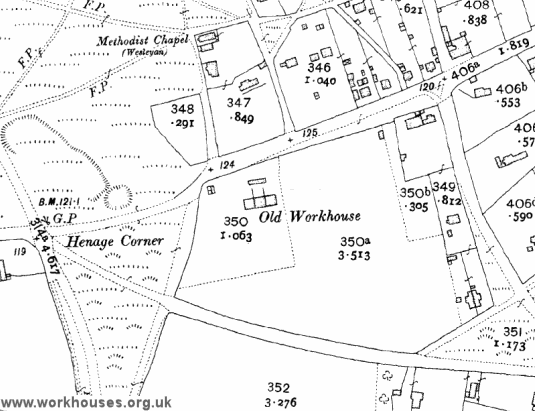
Chobham old workhouse site, 1914.
The location of Byfleet’s workhouse now lies under Stream Close, off Rectory Lane. The building survived until the 1970s.
Horsell’s workhouse was at the east of the village, behind St Mary’s Church.
Pyrford’s establishment, now Glebe House at Pyrford Green, had twelve inmates in 1777.
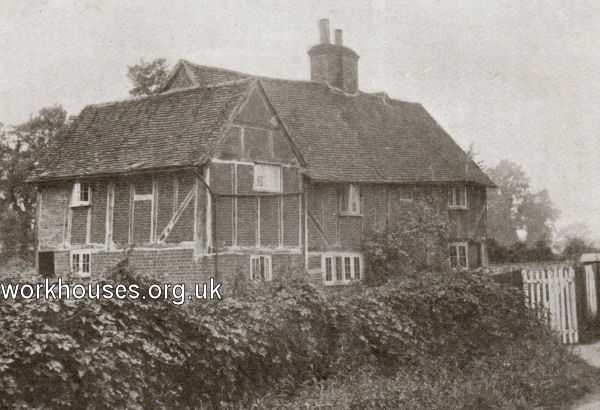
Former Pyrford Workhouse, early 1900s.
After 1834
Chertsey Poor Law Union formally came into existence on 6th November 1835. Its operation was overseen by an elected Board of Guardians, 15 in number, representing its 9 constituent parishes as listed below (figures in brackets indicate number of Guardians where this was more than one):
Surrey:
Bisley, Byfleet, Chertsey (4), Chobham (2), Horsell, Pyrford, Walton-on-Thames (2), Weybridge, Windlesham and Bagshot (2).
Later additions: Thorpe (from 1894).
The population falling within the Union in 1831 had been 13,369 — ranging from Bisley (270) to Chertsey itself (4,795). The average expenditure on poor relief for 1833-5 had been £8,307 or 12s.5d. per head of the population.
A new Chertsey Union workhouse was built in 1836 at Ottershaw on the south side of Murray Road. Its location and layout are shown on the 1870 map below.
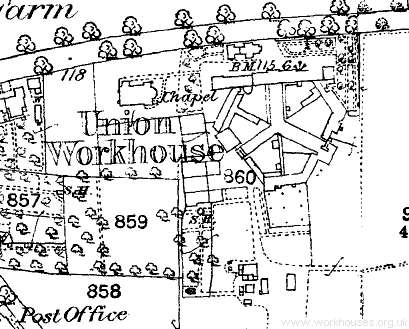
Chertsey workhouse site, 1870
The building was designed by Sampson Kempthorne who was also the architect of many other early workhouses built in the wake of the 1834 Poor Law Amendment Act. Chertsey workhouse was based on his model hexagonal plan with an entrance block facing the road behind which three wings radiated from a central hub in a Y-shape. The areas between the wings formed exercise yards for the different categories of inmates and were surrounded by perimeter walls forming a hexagon-shaped perimeter.
A chapel was erected at the west of the workhouse in 1868. Fever wards were built in 1871 and a mortuary and tramp wards were added in 1883. In 1894, an infirmary was built at the south of the workhouse, together with accommodation specifically for children.
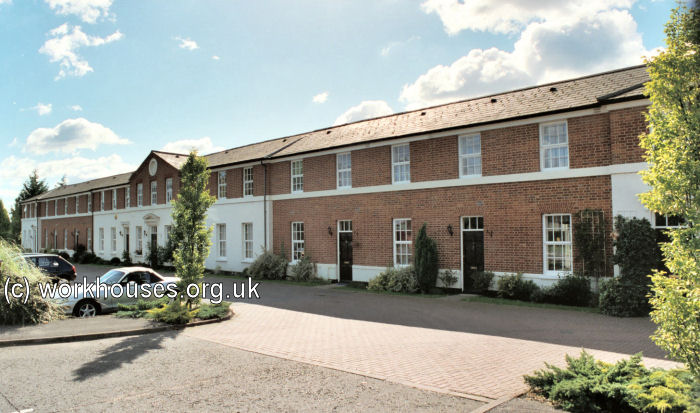
Chertsey entrance block from the north-west, 2001.
©Peter Higginbotham.
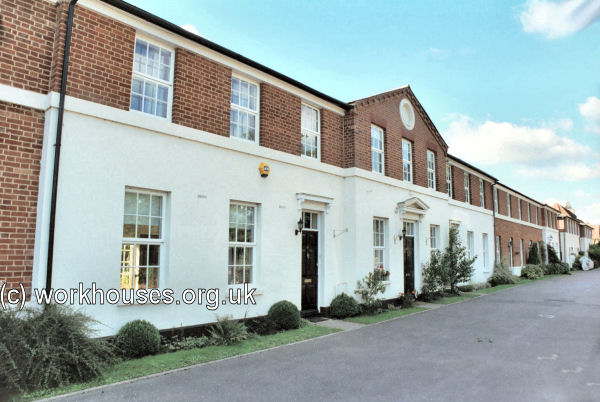
Chertsey entrance block from the north-east, 2001.
©Peter Higginbotham.
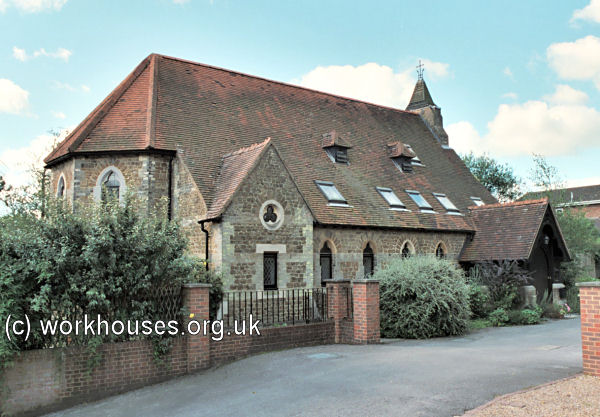
Chertsey chapel from the north-east, 2001.
©Peter Higginbotham.
By 1914, many of the outbuildings forming the original hexagonal perimeter of the workhouse had also been removed as shown on the map of that date.
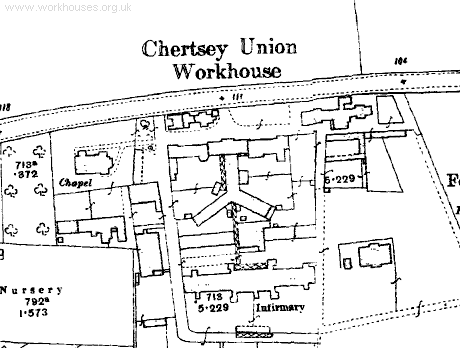
Chertsey workhouse site, c.1914
The picture below, from 1916, shows some of the elderly female inmates with a local hunt and its beagles, at the front of the workhouse.
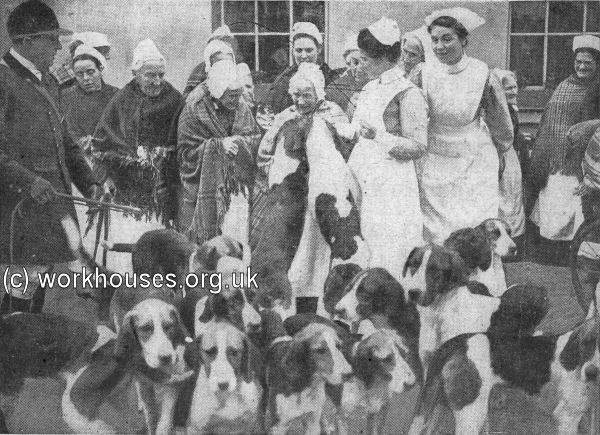
Chertsey workhouse inmates and hunt, 1916.
©Peter Higginbotham.
In 1930, the workhouse was taken over by Surrey County Council and later became Murray House Certified Institution for the Mentally Defective.
Most of the former workhouse buildings have now been demolished. The entrance block and chapel survive, both having been converted to residential use.
Children's Home
By the 1920s, the Chertsey Union had established a children's home at Ottershaw, exact location undetermined. In 1924, it could accommodate 18 children, with Mr E.E. Summers as its Master.
Staff
Inmates
Records
Note: many repositories impose a closure period of up to 100 years for records identifying individuals. Before travelling a long distance, always check that the records you want to consult will be available.
- Surrey History Centre, 130 Goldsworth Road, Woking, Surrey GU21 6ND. Holdings include Guardians' minutes (1835-1874, 1876-1930); Admissions and discharges (1894-1932, with gaps); Births (1866-1914); Deaths (1867-1932); Garden and pig accounts (1924-32); etc.
- Transcriptions of Admission/Discharge Records (1894-1932)
- Surrey workhouse records on FindMyPast
Bibliography
- Higginbotham, Peter Workhouses of London and the South East (2019)
Links
- None.
Unless otherwise indicated, this page () is copyright Peter Higginbotham. Contents may not be reproduced without permission.


